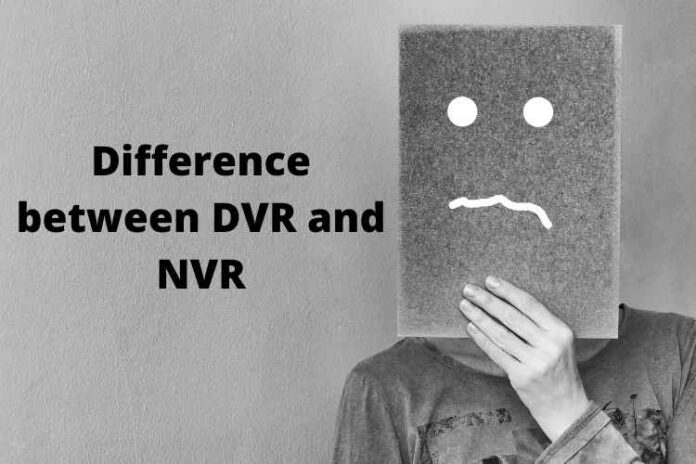In this article, we will discuss the main difference between the DVR and NVR as they are the two types of video recorders that record the videos in digital format but have a lot of differences between them. So read the full article to know about DVR and NVR in detail and get the main differences between them.
What is a DVR?
DVR stands for Digital Video Recorder. It is a consumer electronic device that is used for recording videos in live mode and it is also referred to as a personal video recorder or PVR. It is application software that records the video in digital format to a disk device and in the DVR, the signal is already encoded in MPEG stream format digitally. DVR can display JPEG and PNG images and it also plays music files like MP3 and OGG. The video can be recorded into the USB flash drive, SD Memory Card, SSD, or another storage device. The DVR helps the television set-top boxes (STB) with multiple features including the disk recording, portable media players (PMP) with recordings, and the camcorders which record into the secure digital memory cards.
It provides software for personal computers which features the video capturing facility and also provides features like the consistent image quality and transferring of data to a computer, CD, or DVD. In this way, it proves itself more advantageous than other devices and its convenient search function enables users to quickly locate the show that they want to watch.
What is NVR?
NVR stands for Network Video Recorder which is software that typically runs on a dedicated device that has an embedded operating system. It is used for recording the videos in digital format onto the disk drive, USB flash drive, SD memory card, and other storage devices. The main feature of NVR is that it is generally deployed in an IP video surveillance system. They record the video directly from the network as they lack an ideal and designed special hardware device for recording. In NVR the video is encoded and processed at the camera which is further played to the NVR for storage and remote viewing. There are NVR security systems that are both wired and wireless connections depending on the system. It is easy to set up them as the videos are recorded directly from the web browsers and inform the user via notifications and alarms.
An NVR which is based on an open platform system can support up to 50 cameras. In the NVR, the user-friendly concept GUI (Graphic User Interface) is more highlighted and they work on the principles of motion sensing technology. They are especially used in support of a CCTV camera for the transmission and monitoring of images.
Main Differences between DVR and NVR
Both DVR and NVR video recorders record video in digital format so many ask about the difference between them. The following are the main differences between DVR and NVR which you should know:
- DVR is a type of common consumer electronics while NVR is an application programming that records the video directly from the internet.
- Another difference lies in its full form as DVR stands for Digital Video Recorder while NVR stands for Network Video Recorder.
- As the name suggests, in DVR, the video does not come from the network here and the encoding is done by DVR itself and not by the cameras while in NVR, the video input comes from the network, and encoding is done at the cameras.
- DVR performance is generally fixed while NVR can be replaced and upgraded in a matter of minutes.
- In DVR, performance augmentation requires premium cost components sold by the manufacturer and this is why it cannot be easily augmented and has physical limits while in NVR, the performance can be mainly augmented over short periods which allows the new technology to offer implementations.
- In DVR the maximum resolution is limited by analog camera technology and capture card design while in NVR the maximum resolution is effectively unlimited and the camera Technology continues to enhance the recording of the video.
- DVR can just receive the recording but further, it can not do any changes in it while NVR not only receives the recording but also decodes the images without modification.
- DVR requires components and accessories approved by the manufacturer while NVR which is of the old technology can now be used with viable PCs and can be sold or used for other services.
- In DVR the technology only allows remote video access while in NVR technology allows secure and direct access to the video feeds.
- DVR failures require the DVR manufacturer to service the unit or replacement while NVR failures can be repaired or replaced by the user or from the PC manufacturer.
- In DVR the features which are accessible to the users are limited while in NVR there are more features available to the user.
- In DVR there is no risk as it does not include network accessibility while in NVR there is a risk as network accessing is involved.
- It provides software for personal computers which features the video capturing facility and also provides features like the consistent image quality and transferring of data to a computer, CD, or DVD.An NVR which is based on an open platform system can support up to 50 cameras.
The Final Words
Although both DVR and NVR video recorder records video in digital format, the main difference between them is that NVR in comparison to DVR records the video directly from the network.
I hope this article was helpful and you have got the difference between the DVR and NVR.






















